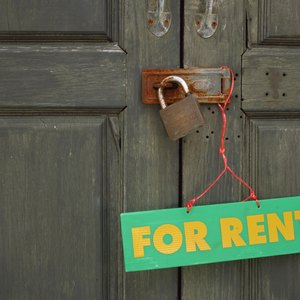
As a renter, it sometimes can feel like your landlord has all the power, deciding what amenities you receive, what you pay each month and even how long you can stay. However, renters have rights too. Each state and municipality lays out its own rules governing the landlord-tenant relationship. If your landlord violates these rights in your lease, it may invalidate your rental agreement.
What Must Be in Your Lease
In order for a written lease to be valid, it must clearly lay out your rent costs, your security deposit amount, when your tenancy ends and the name and contact information for your landlord. If any of this information is missing, your lease is not valid.
Illegal Provisions
It is illegal for a lease to include any rules that infringe on a renter's rights under federal, state or local law. For example, if your state law requires landlords to give tenants 30 days notice before eviction, a lease cannot stipulate that your landlord can evict you with just two weeks notice. If your state or municipality stipulates that security deposits cannot be non-refundable and that they can only be used to pay for apartment damage caused by the tenant, your lease cannot stipulate otherwise. Many localities also make it illegal for a property manager or landlord to enter your apartment without notice. Check your local laws before signing a lease to ensure your landlord complies with all requirements.
Required Disclosures
Many states and municipalities require landlords to disclose certain facts about an apartment before you move in. For example, a state may require all tenants to be notified of any lead paint, asbestos, carcinogenic materials or methamphetamine on your property. Other municipalities require landlords to disclose if they've applied for a demolition permit for the property or if any deaths have occurred in the unit. If your landlord does not disclose this information, your lease may be invalid.
Unfulfilled Obligations
A lease also can be invalidated if your landlord does not follow the terms he set out. For example, if your lease includes a move-in date, and your landlord moves that date significantly, it may invalidate your lease. Additionally, if your landlord gives you an apartment that differs significantly from the one you saw and expected, the lease may be invalid.
References
- Mass Legal Help: Read the Lease Carefully
- UC Berkeley: Invalid Provisions in Leases
- Georgia Consumer Protection Division. "If I Terminate My Lease Early, Can My Landlord Keep My Security Deposit and Charge Me a Fee?" Accessed April 6, 2020.
- Oregon State Bar. "Fees and Deposits." Accessed April 6, 2020.
- Wisconsin State Legislature. "704.29 Recovery of Rent and Damages by Landlord; Mitigation." Accessed April 6, 2020.
- Realtor.com®. "Beyond the Security Deposit: When Can Your Landlord Sue You for Property Damage?" Accessed April 6, 2020.
- The Judicial Branch of California. "Security Deposits." Accessed April 6, 2020.
- Updater. "Breaking a Lease: Everything to Know." Accessed April 6, 2020.
- New Jersey Department of Community Affairs. "Lease Information Bulletin," Page 3. Accessed April 6, 2020.
- Consumer Financial Protection Bureau. "Could Late Rent Payments or Problems With a Landlord Be in My Credit Report?" Accessed April 6, 2020.
- Experian. "Does Breaking a Lease Affect Your Credit?" Accessed April 6, 2020.
- Experian. "How Long Does It Take for Information to Come Off Your Credit Reports?" Accessed April 6, 2020.
- New Jersey Department of Community Affairs. "Lease Information Bulletin," Page 2. Accessed April 6, 2020.
- Michigan Department of Attorney General. "Other Legal Protections and Rights Provided By State And Federal Law." Accessed Apr. 23, 2020.
Writer Bio
John Louis is an award-winning journalist based in Washington, D.C. He attended Columbia University, where he was editor-in-chief of the "Columbia Spectator." He is currently studying law at Georgetown University.

